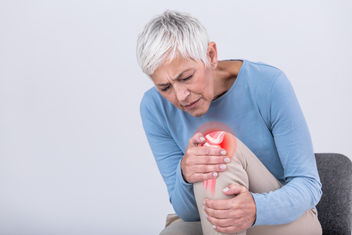Arthritis: Treatment Overview
April 18, 2023Arthritis, both rheumatoid arthritis and osteoarthritis, affects millions of people each year. While medication is a common arthritis treatment, there are a variety of different medications available to treat arthritis. Learn more about the different types of arthritis treatment options available.

The Inside Rx Blog
Get the Inside Scoop on tips & tricks that may help your family save on prescriptions!
Subscribe to stay up to date with the latest news and tips
Reviewed by the Office of Clinical Evaluation and Policy (OCEP), Evernorth
Arthritis is a chronic, debilitating condition that affects millions of Americans in a given year. It is an inflammatory condition that primarily affects the joints and bones.
The two most common types of arthritis are rheumatoid arthritis and osteoarthritis. Rheumatoid arthritis is an autoimmune condition that results from the immune system attacking the joints, while osteoarthritis typically develops over time due to wear and tear on the joints. Other types of arthritis include juvenile idiopathic arthritis, a type of arthritis that develops in children; ankylosing spondylitis, a type of arthritis that primarily affects the spine; and psoriatic arthritis, a type of arthritis linked to psoriasis.
Arthritis treatment consists of different options, including medication and lifestyle changes. Treatment will depend on the type of arthritis being treated, severity of symptoms and other factors, such as cost.
Medications for Arthritis Treatment
Medication is a cornerstone of therapy for all types of arthritis. The goal of medication therapy is to relieve inflammation, pain and other symptoms such as stiffness or discomfort. Medications may be prescribed alone or in combination with other treatments. Consult a healthcare provider for medical advice on the best treatment option.
DMARDs
Disease-modifying antirheumatic drugs (DMARDs) work by altering the immune system's response to inflammation, which can help slow the progression of the disease and improve symptoms. There are several types of DMARDs, including:
- Conventional synthetic DMARDs: These medications are typically taken orally and include methotrexate, sulfasalazine, leflunomide and hydroxychloroquine.
- Biologic DMARDs: These medications are usually given by injection or infusion and include tumor necrosis factor (TNF) inhibitors [such as Humira® (adalimumab)] and interleukin (IL)-6 receptor inhibitors [such as Actemra® (tocilizumab)].
- Targeted synthetic DMARDs: These medications are typically taken orally and target certain proteins or pathways involved in the immune system's response to inflammation. They include janus kinase (JAK) inhibitors [(such as Xeljanz® (tofacitinib)] and phosphodiesterase 4 (PDE 4) inhibitors [such as Otezla® (apremiliast)].
Analgesics
Analgesics are medications that are used to relieve pain. There are several types of analgesics that may be used to manage the pain associated with arthritis, including:
- Nonsteroidal anti-inflammatory drugs (NSAIDs): These medications, such as ibuprofen and naproxen, can help reduce inflammation and pain in the joints. NSAIDs can be taken orally or applied topically.
- Acetaminophen: This medication is a pain reliever that can be taken orally. It does not reduce inflammation but it may be an option for people who cannot take NSAIDs due to side effects or other medical conditions.
- Opioids: These medications, such as morphine and oxycodone, can be effective at relieving severe pain, but they can also have serious side effects, such as respiratory depression and addiction. They are usually reserved for short-term use or for people with severe pain that is not relieved by other medications.
Corticosteroids
Corticosteroids are medications that are used to reduce inflammation and suppress the immune system. They may be used to treat autoimmune forms of arthritis, such as rheumatoid arthritis, and other autoimmune conditions. Corticosteroids for arthritis may be taken orally or injected into the affected joint. Examples include triamcinolone, prednisone and methylprednisolone.
Lifestyle Changes
Lifestyle changes can be an important part of managing arthritis and improving overall health. Some lifestyle changes that may be helpful for people with arthritis include:
- Physical therapy: Physical therapy can help people with arthritis improve their joint range of motion and muscle strength, which can help reduce pain and improve overall function. Exercises may include stretching and range of motion exercises.
- Weight loss: Losing excess weight can help reduce the strain on weight-bearing joints, such as the knees and hips, and may help improve symptoms of arthritis. A healthcare provider or a dietitian can help develop a weight loss plan that is appropriate.
- Exercise: Regular physical activity may also help improve joint function and reduce pain. Low-impact exercises, such as walking, swimming and cycling, may be especially helpful.
In addition to medical and therapeutic treatments, there are several self-management strategies that can help people with arthritis better cope with their condition. These may include stress management techniques, such as relaxation techniques.
Acebutolol Hcl
$ 20.00Prednisone
$ 7.63Bottom Line
There are several different types of arthritis treatment options, depending on the type and severity of arthritis. Though there is no cure for arthritis, these treatment options can help relieve symptoms such as pain and inflammation. Medications may differ in their side effects, uses and costs. Therefore, it’s best to consult a healthcare provider with any questions or concerns regarding arthritis treatments.
Sources: https://rheumatology.org/clinical-practice-guidelines https://www.arthritis.org/treatments https://www.cdc.gov/arthritis/caring/



